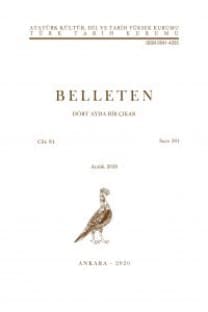Dîvânü Lugâti't-Türk'te Yäzkänd
Divânü lugâti't-türk'ün elde bulunan tek nüshasındaki istinsah yanlışlarına bakarak müstensih Muhammad bin Abi Bakr bin Abi’l-Fath as-Savı şumma ad-Dımışki'nin hiç Türkçe bilmediği kanunla varmaktadır İran'ın Sâve kentinden olan bu müstensihin Türk olmadığı ve Türkçe bilmediği düşüncesine ben katılamıyorum. Sâve ve çevresindeki köylerin halkı (büyük çoğunluğu) bugün bile Türktür. XIII. yüzyılda Türk olmayan bir kişinin (bir Farsın?) oradan kalkıp Şam'a gitmesi, orada Türkçe - Arapça bir yapıtın müstensihliğini yapması akla yakın görünmemektedir. Yaptığı yanlışlara gelince, Divânü lugâti't-türk gibi birçok Türk lehçesinden örnekler veren bir yapıtı Türk asıllı da olsa herhangi bir müstensihin kolayca anlayamayacağı göz önünde bulundurulmalıdır. Yapıt üzerinde çalışıldıkça yeni istinsah yanlışları ortaya çıkabilir. Bu yazıda böyle bir istinsah yanlışı üzerinde durmak istiyorum.
In the Light of British Foreign Office Documents: How Abdulhamit, the Ottoman Sultan, Leased Cyprus to Britain within Forty-Eight Hours
The Cyprus Convention : Article I of the Convention of Defensive Alliance - better known as the "Cyprus Convention" - signed between the Ottoman and British Governments on 4th June, 1878, was as follows: "If Batum, Ardahan, Kars, or any of them shall be retained by Russia, and if any attempt shall be made at any future time by Russia to take possession of further territories of His Imperial Majesty the Sultan in Asia as fixed by the Definitive Treaty of Peace, England engages to join His Imperial Majesty the Sultan in defending them by force of arms. In return, His Imperial Majesty the Sultan promises to England to introduce the necessary reforms, to be agreed upon later between the two Powers, into the Government and for the protection of the Christian and other subjects of the Porte in those territories. And in order to enable England to make the necessary provision for executing her engagements, His Imperial Majesty the Sultan further consents to assign the Island of Cyprus to be occupied and administered by England". The above Convention contained provisions of the highest political importance, for by it the British Government had entered into a formal engagement to maintain the integrity of the Turkish dominions in Asia against Russia. The general guarantee of integrity of Turkey incorporated in the Treaty of Paris of 1856 having broken down, Great Britain then acted alone. It was, according to J. W. Headlam- Morley and W. J. Childs of the British Foreign Office', a far reaching military commitment of a kind to which the British Government and Parliament had in those years been very averse.
